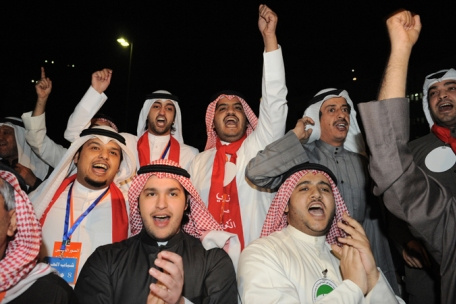On the Recent Unrest in Kuwait

By: Ali Jannati*
The state of Kuwait is one of the six Arab countries of the Persian Gulf region that are based on a hereditary system of governance, and it is one of the founding members of the [Persian] Gulf Cooperation Council. Although the Al-Sabah family has been ruling the sheikhdom in the last two centuries, for long Kuwait was the only country in the region enjoying a constitution since its independence in 1961. Separation of powers, an elective parliament and press freedom and the main principles of the constitution have been observed in this country so far.
While the Kuwaiti Emir is entitled to dissolve the parliament according to the constitution, free elections are held and with the amendments made in the law, universal suffrage has been granted to Kuwaiti citizens, both men and women. The prime minister and his cabinet are assigned by the Emir. The parliament is not involved directly in the assignment of ministers, but can question and impeach the prime minister and his ministers. The National Assembly of Kuwait, known as the Majlis Al-Ummah, includes 50 legislators from five constituencies. The ministers join the fifty members of the parliament after taking an oath; occupying 16 seats, roughly one fourth of the parliamentary seats.
The present parliament-- which started its tenure in 2009-- includes various political, religious and tribal strands: Islamist Salafists, the Muslim Brotherhood and Shi’a groups; both liberal and fundamentalist elements actively participate in parliamentary debates. Nasser Mohammed Al-Sabah, the Kuwaiti Prime Minister and the nephew of Emir of Kuwait Sheikh Al-Sabah Al-Ahmed, has chaired the executive body since February 2006. Before the 1979 Islamic Revolution of Iran, he served as the Kuwaiti ambassador to Tehran for 10 years. During the past three decades, the minister of information, minister of social affairs and labor, minister of state for foreign affairs and minister of the Emiri Diwan have been his other positions. As an unwritten rule, key positions in the cabinet, such as the ministry of foreign affairs, the minister of interior and the defense ministry have been monopolized by the Al-Sabah family.
Currently, the major Kuwaiti parliament factions include the National Democratic Alliance, the National Islamic Alliance, the Islamic Salafi Alliance, the Popular Action Bloc and the Justice and Peace Alliance. During the past four years, representatives from the Salafi Alliance, the Popular Action bloc and the National Action Bloc have challenged the prime minster, repeatedly summoning Nasser al-Sabah for an impeachment session, once a taboo in Kuwaiti politics. Sheikh Nasser has, however, survived the successive impeachments, winning the majority of the votes of parliament members. The inefficiency of the prime minister in taking prospective measures, planning and resolving the country’s problems; economic failures despite the huge financial resources of the country, and an inability in developing the country; plus rampant bureaucratic corruption and bribery in different administrative levels, have been the main points of criticism leveled at Sheikh Nasser by the opposition.
The most recent issue brought up by some of the representatives is the alleged million-dollar bribes paid by the government to a number of lawmakers to encourage their cooperation with the cabinet. The accusations raised harsh criticisms against the prime minister in parliament (and by public opinion) but this unsubstantiated news may be destined to pressure the government and to depose the prime minister.
During recent months, some Salafist representatives -generally associated with and directed by Saudi Arabia- have invited their supporters to hold public gatherings and rallies, and have called for the prime minister’s resignation. The Saudis, the self-proclaimed big brother of Persian Gulf Arab states who tend to think of themselves as the savior of Kuwait from the claws of Saddam Hussein- have not repressed their dissatisfaction with the parliament and the political and press freedom in Kuwait, trying to portray the country’s democracy as unsuccessful in order to prevent it from turning into a progressive model for the Saudi Arabia and other Arab countries of the Persian Gulf region.
Riyadh has also failed to hide its anger at Sheikh Nasser Al-Sabah, the Kuwaiti prime minister, frequently urging him to resign, since due to his long-time mission to Iran, Sabah is emotionally connected to Iran, and has tried to make a balance between the Shi’a community, which forms one third of Kuwait’s population, and the Sunnis. Considering the Saudis’ influence in Kuwait, they try to instigate popular rallies and unrest in the country through manipulation of the Salafist lawmakers and those with dual citizenship in order to overthrow the government of Nasser Al-Sabah. The recent occupation of the parliament by citizens provoked by Salafi legislators’ speech in Al-Iradah Square and their march towards the Prime Minister’s mansion can be traced back to Riyadh’s instigations. The event was followed by reactions of the Emir of Kuwait, the cabinet and some parliament members for resorting to street rallies instead of legal measures. The armed forces were assigned to prevent any anti-government gathering. The majority of the political elite and the media have criticized the move.
Political observers argue that considering the political and economic structure of the country, that is, the relative welfare of its people and the existing political freedom, such protests could not turn into an all-inclusive movement that could lead to fundamental changes in the political system. If the parliamentary unrest continues, the assembly may be dissolved by the Emir, which will be followed by a new round of election. In that case, the next government may not be as tolerant of the opposition MPs and the demonstrators.
* Ali Jannati is the former Iranian Ambassador to Kuwait and son of Ayatollah Ahmad Jannati, Chairman of the Guardian Council.

